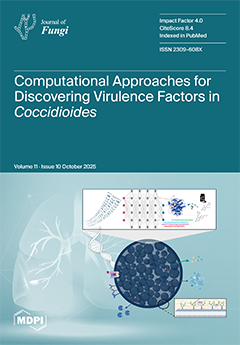Sugarcane smut, caused by
Sporisorium scitamineum, is a devastating fungal disease of sugarcane. Sexual mating/filamentation of opposite mating types is a key step in the infection and pathogenicity of
S. scitamineum, yet its regulation remains unclear. In this study, we identified
[...] Read more.
Sugarcane smut, caused by
Sporisorium scitamineum, is a devastating fungal disease of sugarcane. Sexual mating/filamentation of opposite mating types is a key step in the infection and pathogenicity of
S. scitamineum, yet its regulation remains unclear. In this study, we identified a cytochrome P450 enzyme-encoding gene,
SsCYP64, which plays an important role in oxidative stress and maintaining cell membrane stability in
S. scitamineum. Further investigations revealed that deletion of
SsCYP64 leads to a decrease in the transcriptional level of
SsPRF1, a key transcription factor regulating the sexual mating of
S. scitamineum. Subsequently, the constitutive expression of
SsPRF1 restored the defect in sexual mating/filamentation of the
SsCYP64 deletion mutant, indicating that SsCyp64 regulates the sexual reproduction of
S. scitamineum by mediating the transcriptional level of
SsPRF1. In addition, metabolomic analysis revealed that the fatty alcohol metabolite γ-linolenyl alcohol significantly decreased in the
SsCYP64 deletion mutant, whereas exogenous supplementation with γ-linolenyl alcohol increased the transcriptional level of
SsPRF1 and partially restored the sexual mating/filamentation of the
SsCYP64 deletion mutant. In conclusion, our results indicated that SsCyp64 mediated the transcription of
SsPRF1 by modulating γ-linolenyl alcohol levels, thereby regulating the formation of dikaryotic hyphae in
S. scitamineum. These findings provide new insights into the role of cytochrome P450 enzymes in the pathogenic process of plant pathogenic fungi.
Full article






